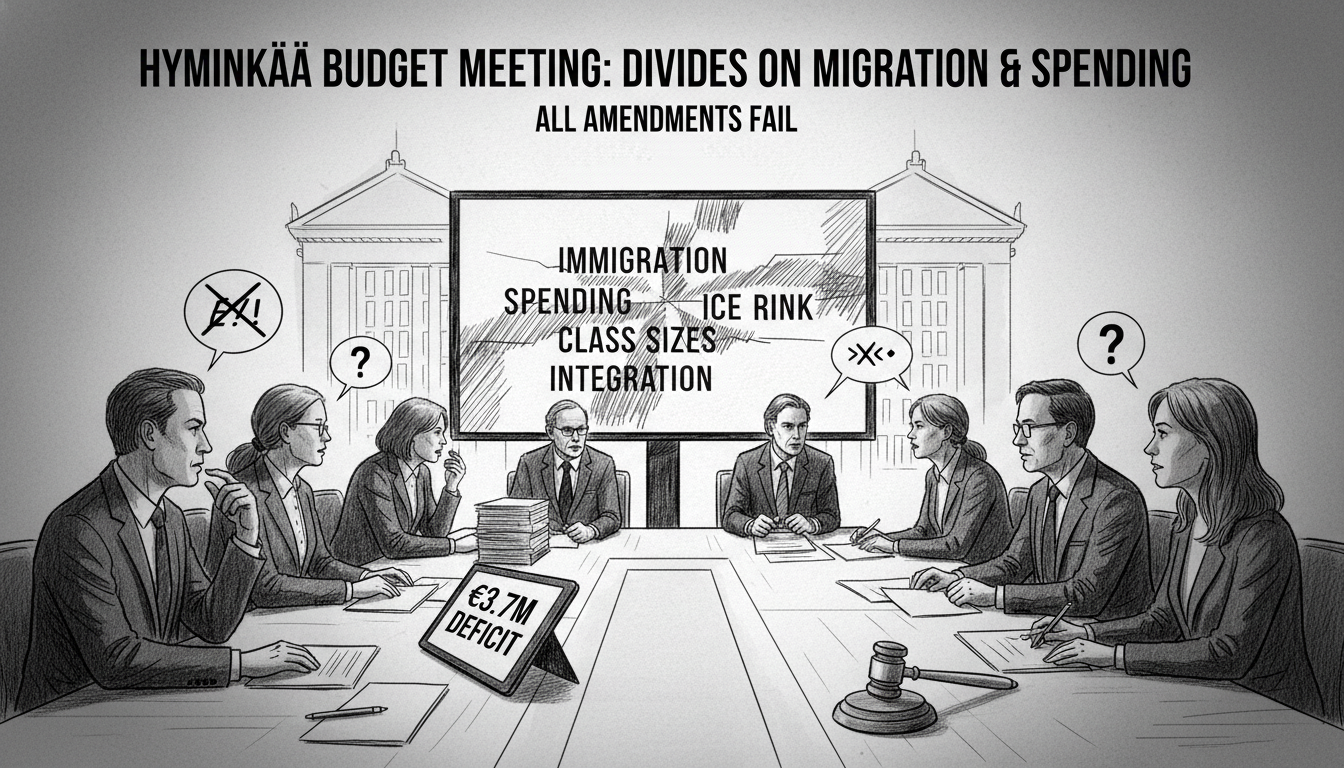A marathon budget meeting in Hyvinkää exposed fundamental political divisions over immigration, public spending, and the city's future direction. The nearly five-hour session saw city council members debate a proposed €3.7 million deficit budget while clashing over everything from artificial ice rinks to classroom sizes.
City Manager Johanna Luukkonen presented her first negative budget proposal, describing it as exceptional circumstances requiring fiscal restraint. She explicitly requested no additional permanent spending, a position supported by both the Social Democrats and National Coalition Party.
"In this situation, we cannot add new permanent expenses," confirmed City Board Chair Pinja Perholehto, aligning with the city manager's cautious approach.
The debate revealed underlying tensions about Hyvinkää's population trends. Social Democrat Pekka Laine expressed concern about neighboring municipalities outpacing Hyvinkää's growth. "Järvenpää and Nurmijärvi are breathing down our necks. They might even pass us. That's not necessarily bad, but perhaps it's a matter of pride," Laine noted.
National Coalition representative Antti Rantalainen focused on the city's debt situation, pointing to construction cranes across the cityscape as evidence of growing financial obligations. He emphasized the need to consider where tax revenue originates, not just how it gets spent.
Despite budget constraints, the Centre Party proposed adding €1.3 million for an artificial ice rink investment. They also suggested the city should consider funding the Kytäjä light traffic route directly rather than through external financing.
The Left Alliance challenged the budget's deficit projections, noting that €1 million reserved for unexpected expenses might reduce the actual shortfall if unused. They also objected to adding "on average" to class size targets, arguing it weakened educational standards.
Immigration emerged as the most contentious issue, though unrelated to the budget's main lines. The debate turned heated when the Finns Party proposed terminating the city's integration cooperation agreement with the Ely Centre.
Finns Party representative Katriina Reponen referenced a French report about Muslim Brotherhood infiltration at local levels, noting Hyvinkää already has a mosque. "We cannot compare Karelian evacuees to radical Muslims from the Middle East," Reponen argued.
Other council members pushed back strongly. Green Party member Santeri Leinonen countered by asking how many Karelian evacuees had been settled in Hyvinkää historically, noting that Finnish war orphans also received assistance in their time.
Left Alliance representative Anu Karvinen stated bluntly that Hyvinkää's population grows solely because of immigrants. "Let's make immigrants into new taxpayers for us. Otherwise we'd be a shrinking municipality and would have to turn off the lights," Karvinen said.
The political reality is that Finnish municipalities face structural challenges with aging populations and rising service costs. Hyvinkää's debate reflects broader national tensions between fiscal conservatism and maintaining welfare services, compounded by increasing polarization around immigration.
In the end, all proposed amendments failed, and the council approved the city board's original budget proposal by an overwhelming majority. The outcome demonstrates that while political debates may grow heated, established budgetary processes typically prevail in Finnish municipal governance.
This budget meeting reveals how local Finnish politics increasingly mirrors national divisions, particularly on immigration. The straightforward economic discussion about deficits and investments quickly transformed into a broader cultural debate, suggesting these tensions will continue shaping municipal politics across Finland.

